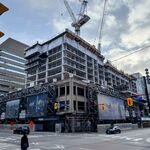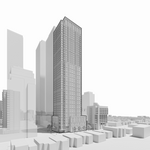Fresh Start
Banned
I wasn't attacking the bus network in Toronto. I love buses, just give them their own reserved lanes so that they can drive faster. I was just criticizing the boneheaded decision to replace overcrowded buses along congested corridors with overcrowded light-rail trams along congested corridors, whilst masquerading it off as something it is not. Its placing the same people into a different vehicle type yet offering no real time advantage. Comparatively, I can from Rogue Hill GO to the CBD in under a half hour. It takes 1 hour and 45 minutes aboard the 54 Lawrence East bus just to get from that same GO station to Yonge Street. So assuming suburban commuters to the CBD/downtown core can afford to live within a 2 kilometrer radius of a GO station, looks like they may have it a little better off than a lot of city-dwellers.




